October 19, 2018
by Carla Hay
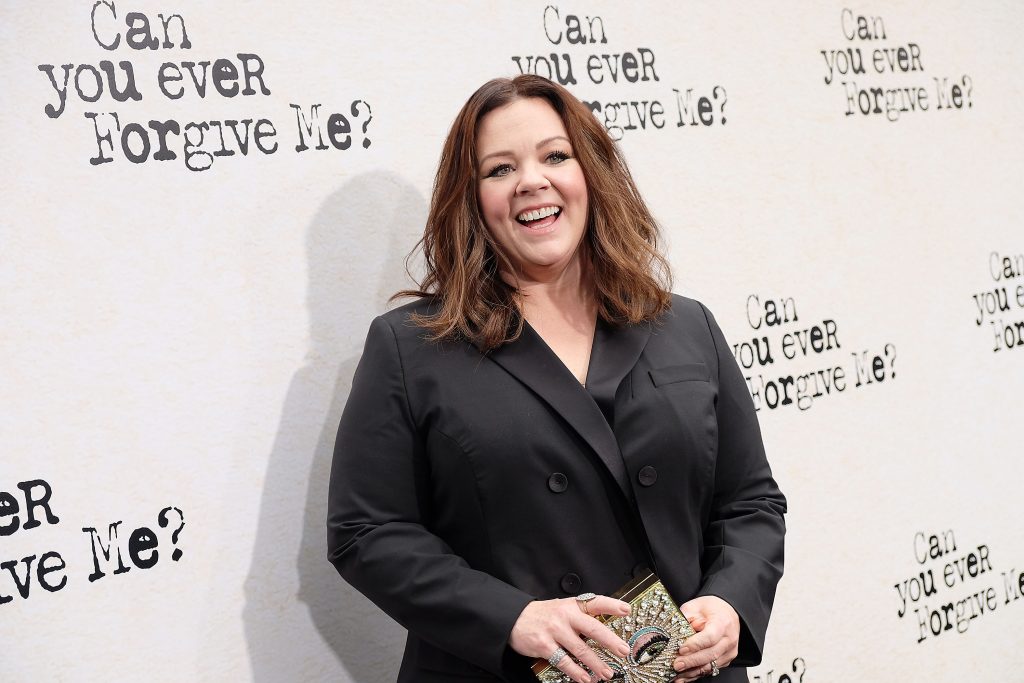
Melissa McCarthy has played several characters who are social misfits, but those are usually in comedies. The dramatic film “Can You Ever Forgive Me?,” which is inspired by the true story of author-turned-forger Lee Israel, is a very different role for McCarthy, who is getting a lot of critical acclaim for playing the troubled Israel. McCarthy has already won Emmy Awards for starring in the sitcom “Mike & Molly” and guesting on “Saturday Night Live,” and she received an Oscar nomination for her supporting role in 2011 comedy film “Bridesmaids,” but “Can You Ever Forgive Me?” is her first dramatic film for which she is getting significant awards buzz. The movie, which is set in 1990s New York City, tells the story of how a financially desperate Lee, who was once a successful biographer but whose latest books have been flops, turns to fabricating letters from famous dead authors and selling the forgeries to pay her bills. When some of her buyers start to get suspicious, she resorts to stealing real archived letters from research institutions, replacing the original letters with forgeries, and selling the stolen originals.
Lee is an unapologetic loner whose brusque manner often alienates people, but she reconnects with an old acquaintance—perpetual con artist Jack Hock (played by Richard E. Grant)—to help her with her forgery scams, with the flamboyant and charming Jack going to potential buyers and selling many of the fake documents for her. The relationship between Jack and Lee isn’t exactly a warm and fuzzy friendship; it’s more like an uneasy alliance that probably wouldn’t have happened if the ill-mannered and introverted Lee didn’t need a cohort who was better at dealing with people.
The real Lee Israel, who died in 2014 at the age of 75, forged hundreds of documents, and she and Jack were eventually caught and faced legal consequences. She wrote about her life of crime in the 2008 memoir “Can You Ever Forgive Me?” The movie was directed by Marielle Heller, with a screenplay by Nicole Holofcener and Jeff Whitty. The film’s cast also includes Dolly Wells as a bookstore owner who tries to befriend Lee; Jane Curtin as Lee’s increasingly exasperated agent; Anna Deavere Smith as Lee’s ex-lover whom Lee still tries to contact; and Ben Falcone (McCarthy’s real-life husband) and Stephen Spinella as literary collectors who make multiple purchases of Lee’s forgeries. McCarthy recently sat down with me and other journalists for a roundtable interview at the “Can You Ever Forgive Me?” press junket in New York City. Here is what she said.
Did you ever have a time when people told you that you couldn’t be an actress, but you did it anyway?
Yeah. I don’t even know if I knew what an actress was. I don’t know exactly what I thought I was going to do. I didn’t even quite have a thing to conjure. I know when I came to New York, I did not know how to do the business side of it. I’m not upset that I focused on the work. I studied, and I did plays. It didn’t help me survive any better, but I think it was good for learning.
I finally met with a manager, and I was so excited. I met with her in her studio apartment. Then she was like, ‘You’re never going to work.” I do remember her saying, “You’re never going to work. You have to lose weight.” But the point of that was, I think I was a [size] 6. I was like a little thing. And, somehow, in me I was just like, “Well, that seems crazy. That seems nuts.”
I was like, “I think you’re working out of your studio. Maybe you’re not the most business-savvy either.” I don’t know where that came from. Now at 48, I was like, I’m so glad I said it. It was probably a fluke.
But I remember just being in there and being, like, “I’m not going come back and sit in your bedroom to talk about why I’m not going to work, so see you later.” I think that stopped me from looking for representation for a long time. I thought, “I’ll just submit myself for plays.”
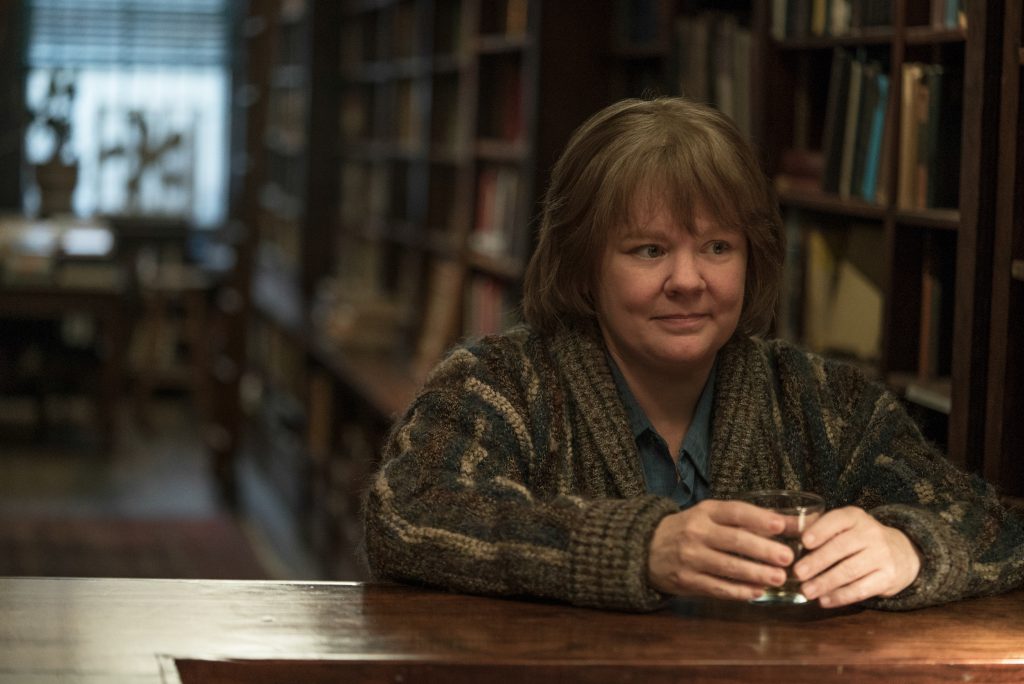
A lot of people are talking about how different “Can You Ever Forgive Me?” is from your other movies. Can you talk about how different you are from the real Lee Israel, who was a bitter, depressed person who liked cats more than people?
I’ve had up to 30 cats.
Up to 30 cats at one time?
Yes. I’ve had 25 to 30 cats rush [up to] a car, and it would actually scare people. It was like a horror movie. People would have [cat] litters, and nobody would adopt them. And that’s how you end up with 30 cats outside.
There was a lot, energy-wise and social-wise, that Lee is different from me. But Michelle Darnell [the character McCarthy played in “The Boss”] and her harshness were also so abrupt, but a different energy. It’s fist-forward for her. I see similarities for them: Shove first before you’re shoved.
But certainly, the inward quality of Lee was fascinating to play. Instead of verbally responding, to know that Lee would probably just sit and watch and wait for that person to leave. Certainly, verbally she could have always come up with a line and a quip, and she often did, but it was interesting to change that pacing and timing, and direct it inward and wait someone out.

Can you talk about getting into costume for the Lee Israel character?
It’s a bit of Tetris of what will fit. One of my favorite things was when things didn’t fit right. I was like, “Leave it.” Like It shouldn’t fit, it’s 15 years old. She’s probably not the exact same shape, size, from age, from whatever it is. I did love that, because you don’t get that in a movie very often, where you let the bad fit kind of ride. It always helps.
When it all clicks in, I feel like, “Now I know the gait. Now I know the walk.” I kept thinking of it as her armor—her cashmere and tweed armor—but once it got on, I really felt the weight of her. The [clothes] were heavy. I just had things of a certain weight on me at all times. I thought she really feels weighted.

What did you know about Lee Israel before doing this movie? And what attracted you to the role?
I didn’t know her story. And it bothered me that I didn’t. I felt like I should have. What attracted me was, first of all, it’s a fascinating story. It’s not even the area that you’d expect a crime to happen. You don’t expect that type of person to end up with the FBI after them. And it’s not like she’s smuggling drugs; it is for literary forgeries. I know it’s a crime. She’s grifting people, for sure.
I think especially now, I loved how she did not require anyone to tell her what she was. I think we’re in a current state where people really need people to validate who they are. “How was my vacation? Do you like me if I went to this party?” They need the reflection of others to see themselves.
I don’t think like that, and I love that Lee just didn’t need it. She was going to be who she was going to be, even when it made it much more difficult for her. I find that a really attractive quality. Even when it’s slightly unpleasant, I still admire it.
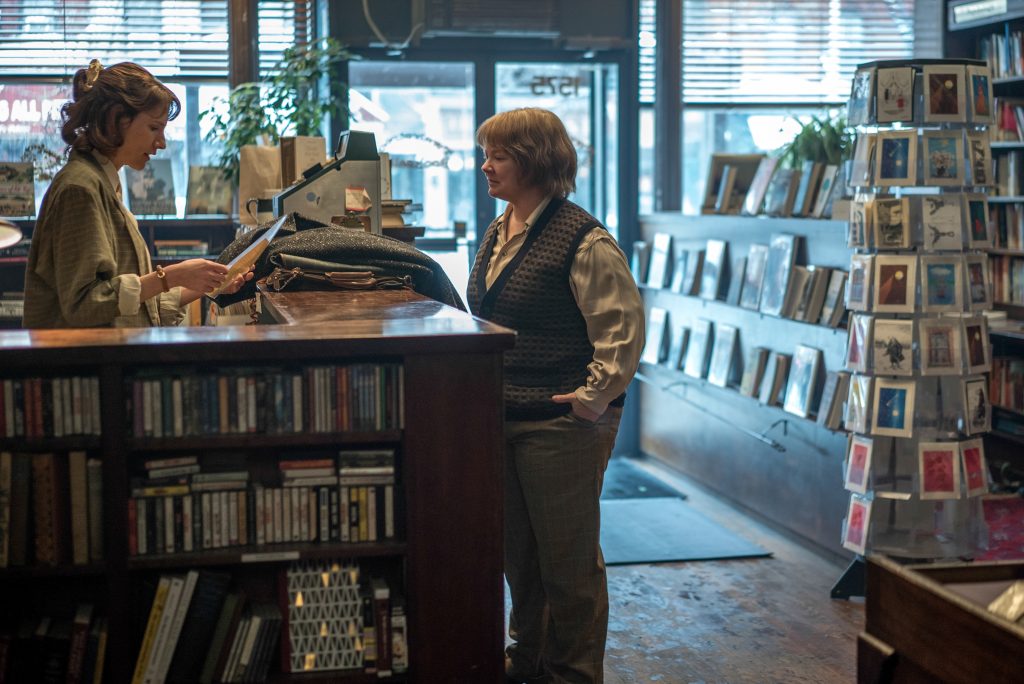
As an artist, how do you view the limitations of talent versus the business side of art?
It’s a very current issue, and it’s a constant issue. Lee was an incredible writer. That was she did. It was the only things she did. And to suddenly be told that you are no longer valid, that you’ve come to a certain age, and you’ve become obsolete. Her writing was still good, but she was a woman of a certain age. She wasn’t adaptable. She had no flexibility to go out and get a different job, or go out on an interview and charm someone. That was not going to happen. We see it in the film. That was accurate to her life. She couldn’t do anything else. And she wasn’t a people person, to say the least.
And I was thinking, “What would any of us do if we lost our one means to survive?” She was on welfare at one point. She was going to lose her apartment. She was going to be homeless. It’s not like she had a bunch of friends that were going to take her in.
And at a certain age, instead of being revered, like, “Oh my gosh, you have 30 years of experience! How amazing,” it’s “What about that 20-year-old?” or “What about that person who’s more fun at the party?” It certainly doesn’t make that person a better writer or artist or fill in the blanks of whatever you may be. But it’s strange that more experience means you’ve become outdated. I find that very strange.
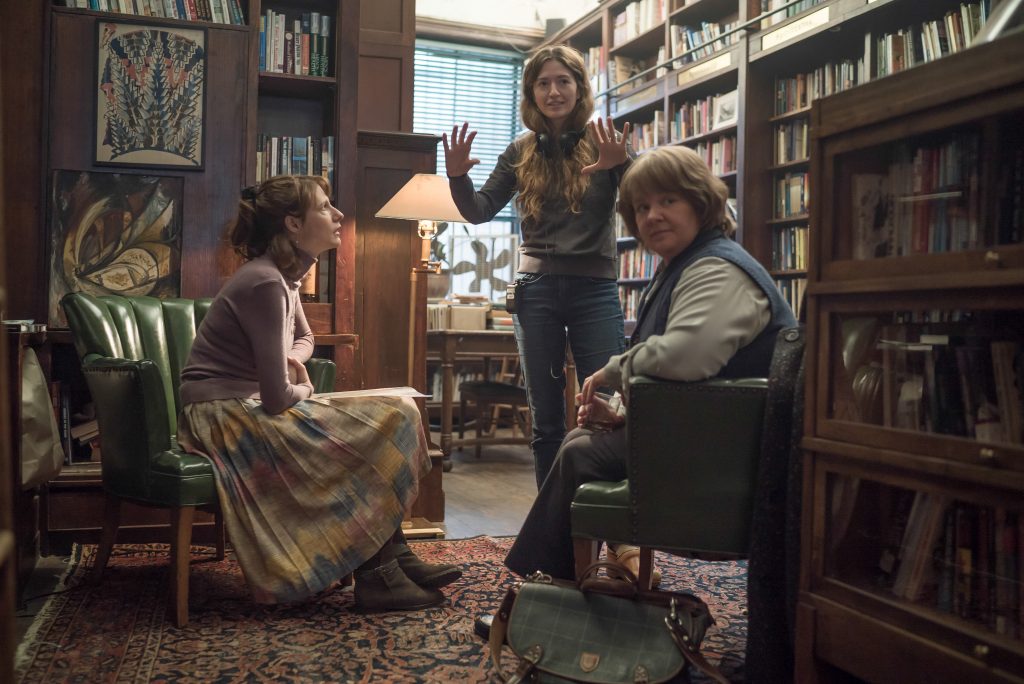
What did you learn about that era of New York City?
That era of New York is my New York. I moved here when I was 20. I lived here from 1990 to 1997. So, to me, it’s the most magical time. I loved it. I came from a little farm town, so the grit [of New York City] and people working four jobs [appealed to me]. We [my roommates and I] lived three in a studio, but we had a Manhattan apartment. And it all seemed magical, like going to Alphabet City and saying, “There’s a party on B [Street]. Do we risk it? Yes!” Now, it’s like $2 million studio apartments. I’m like, “What?”
I don’t understand the current New York. It’s not mine, so I take maybe unreasonable ownership of those ‘90s, and it was everything to me. It’s not the shiny walk through Central Park New York that you so often see in movies and films, which is beautiful and I love.
But I think [“Can You Ever Forgive Me?”] is a really great glimpse into really living in New York and to be part of the city that you’re tethered to in a different way. We’re not always strolling through the park. It’s the real pulse of it. I think recreating that, I felt pretty overwhelmed a couple of times. I never thought I’d get to have that back.

What inspired you to move to New York?
I just wanted something different. We went to a Chinese restaurant on the outskirts of Chicago when I was a kid, and I heard theme music. It was the most exotic thing I had ever seen in my entire life. My dad, who’s from the South Side of Chicago, said, “We moved out to a farm to keep you out of the city, and you literally had a magnet [to go to a big city]. Once you hit a certain age, the fascination was unreasonable.”
I moved to New York having never been there [before]. I don’t think I was on a plane until I was 19. I had $35 when I landed at LaGuardia [Airport], which was not the smartest move. I mean, thank God it was based on no good thinking, or I never would have done it. I just showed up, and I thought, “This should be easy. Then I was like, “What am I doing? Oh my God, I have no money!” I was sharing a bagel a day with somebody, and I just started collecting jobs.

Lee and Jack both happen to be gay. How do you think having that in common affected their friendship?
People were not rushing out to help [the LGBTQ community]. We still have a ways to go, but [homosexuality] is not accepted as it is now. In my heart, I think it was just two people who were on the outside. It was one more slice of the pie of their loneliness, their isolation.
They were both kind of desperate. I think they were both people who probably couldn’t go back to their families. It was just one more element to why these two very unlikely people colliding into each other and why it worked.

Lee’s career downfall was partially due to her having writer’s block, but a deeper issue was that she was locked into this idea that she could only be a biographer, and she didn’t want to go out of her comfort zone. Considering her knack for making things up, she would have made a great fiction writer. As a writer yourself, can you talk about being put in certain category and going outside of your comfort zone?
We love to categorize people. I agree with you. I thought so many times, “Boy, I would’ve just loved to have heard her roll out a fictional story. It would’ve been so funny and have a bite to it, for sure. This is my opinion, and how I think I run parallel to Lee: I love what I do because I do it via someone else. Maybe it’s the coward’s way.
I don’t want to play a person who’s really similar to myself. I don’t know how to do it. I actually feel like I don’t have the skills to, in a scene, figure out what I would do. Through someone else, I’m much more assertive or vulnerable when I get to wear the cloak of someone else.
And I feel like Lee did the exact same thing. I feel like we had the ability to channel through people. So doing biographies was her way of always having someone kind of shield her. She was at her best kind of standing behind someone else.
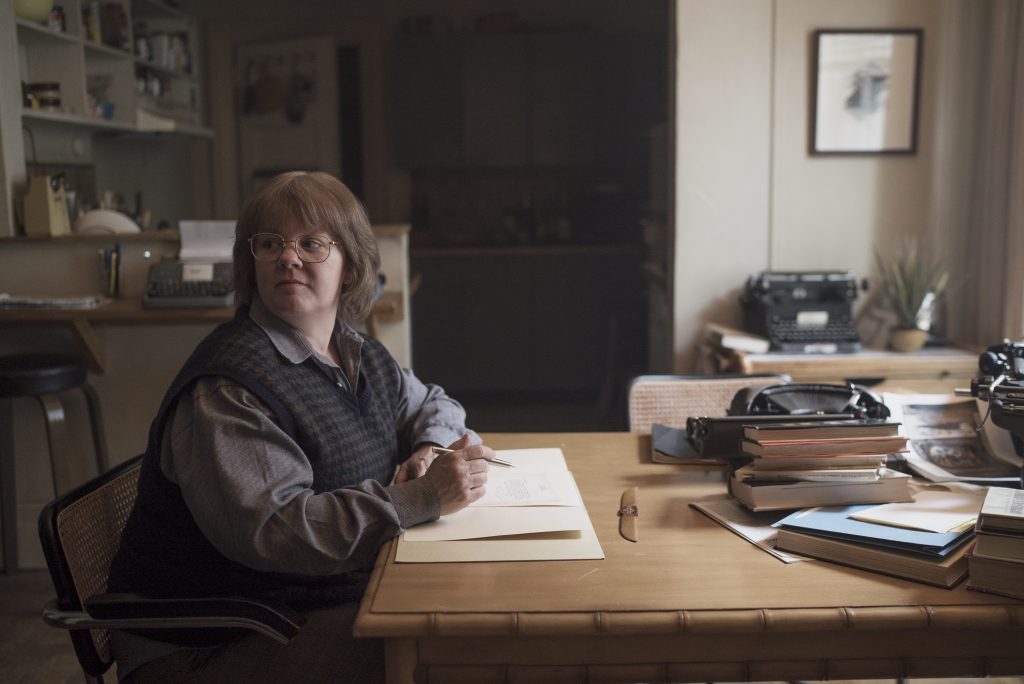
People know you for comedy, so how do you think your comedy-loving fans will react to you in this role?
I didn’t pick it or fall in love with it for any different reason from anything else that I do. I loved the character of Lee and the story. And when I read the script, I thought, “This is something that doesn’t come around [that often].
When I first read it, [my husband] Ben had the part first when [the movie] was in its original incarnation, which fell apart, as movies do. I read it because he was doing the part that he ended up playing. I read the script in record time, and I said, “This is unbelievable.” I said, “I don’t know why, but I think I love this woman. She shouldn’t be so endearing, but she is.”
And I just kept talking about it. And when it didn’t work out, I couldn’t let it go. I wanted to see the movie, and I thought, “Well, somebody has to do that [role]. It’s too good, and it’s fascinating. Who’s going to do it?”
And weeks later [I was still talking about it], and [Ben] was like, “Oh my God! Let it go!” It really bothered me that her story wasn’t going to be told. So I wormed my way into Ben’s movie. I was just like, “I feel like I have a connection to her that doesn’t happen very often.”
Mari [Heller] came in [to working on the movie] almost at the same time. We just had the same gut feeling about the tone and how we wanted to tell it, and it all then came together really quickly.
Anytime I take something, no matter how it does or how it plays, I’ve been lucky enough to have loved the people I’ve played. Once I really lock on to a person, I feel really responsible to tell their story.

If Lee were alive today, what questions would you ask her? And what advice would you give her to be a happier person?
She wouldn’t [ask for my advice]. She’d probably tell me to stop talking. I’ve often said, “I wonder how annoyed Lee would be with me, because I would ask her a lot of questions.” I would have loved to have met her.
There are so many stories from [producers] David Yarnell and Anne Carey, who knew her for many years. David knew her for 20 years. He’s actually the reason why she wrote the memoir. He says she was such a pain in the butt because she did not want to write it. She did not want to write about herself.
As in Lee’s fashion, everything about it was difficult. She finally wrote it, and it was great thing for her, but it took a long time. Anne Carey knew her for 10 years. That’s where I got all my Lee stories from.
Do you think that your role in “Can You Ever Forgive Me?” is the best acting you’ve done so far?
I certainly loved every minute of doing it. There was a very solid feeling. Every single person who came into this little movie … it felt different. It felt like we were in this bubble floating through Manhattan and getting away with something or existing in this alternate universe. I never want to start ranking [my work]. I’d go insane.
